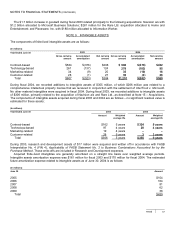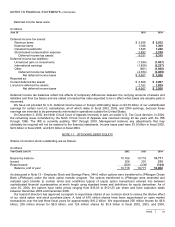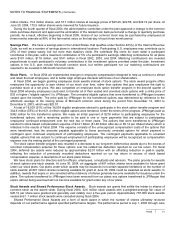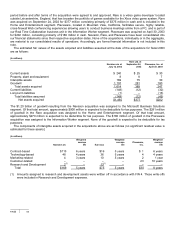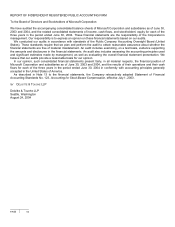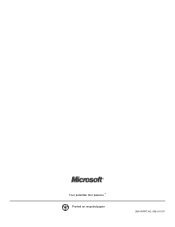Microsoft 2004 Annual Report Download - page 56
Download and view the complete annual report
Please find page 56 of the 2004 Microsoft annual report below. You can navigate through the pages in the report by either clicking on the pages listed below, or by using the keyword search tool below to find specific information within the annual report.
PAGE 56
state antitrust laws. A Judgment was entered on June 7, 2000 ordering, among other things, our breakup into two
companies. On June 28, 2001, the U.S. Court of Appeals for the District of Columbia Circuit affirmed in part, reversed in
part, and vacated the Judgment in its entirety and remanded the case to the District Court for a new trial on one Section 1
claim and for entry of a new judgment consistent with its ruling. In its ruling, the Court of Appeals substantially narrowed
the bases of liability found by the District Court, but affirmed some of the District Court’s conclusions that we had violated
Section 2. We entered into a settlement with the United States on November 2, 2001. Nine states (New York, Ohio,
Illinois, Kentucky, Louisiana, Maryland, Michigan, North Carolina and Wisconsin) agreed to settle on substantially the
same terms on November 6, 2001. On November 1, 2002, the Court approved the settlement as being in the public
interest, conditioned upon the parties’ agreement to a modification to one provision related to the Court’s ongoing
jurisdiction. Two trade groups unsuccessfully sought to intervene to challenge the approval of the settlement and have
appealed. Nine states and the District of Columbia continued to litigate the remedies phase of New York v. Microsoft. On
November 1, 2002, the Court entered a Final Judgment in this part of the litigation that largely mirrored the settlement
between us, the DOJ and the settling states, with some modifications and a different regime for enforcing compliance. The
Court declined to impose other and broader remedies sought by the non-settling states. Two states, Massachusetts and
West Virginia, appealed from this decision. West Virginia dismissed its appeal as part of a settlement with us of several
other cases. On June 30, 2004, the U.S. Court of Appeals for the D.C. Circuit unanimously affirmed the settlement and
the Final Judgment.
European Commission competition law matter. On March 25, 2004 the European Commission announced a
decision in its competition law investigation of Microsoft. The Commission concluded that we infringed European
competition law by refusing to provide our competitors with licenses to certain protocol technology in the Windows server
operating systems and by including streaming media playback functionality in Windows desktop operating systems. The
Commission ordered us to make the relevant licenses to our technology available to our competitors and to develop and
make available a version of the Windows desktop operating system that does not include specified software relating to
media playback. The decision also imposed a fine of €497 million, which resulted in a charge of €497 million ($605
million). We filed an appeal of the decision to the Court of First Instance on June 6, 2004 and will seek interim measures
suspending the operation of certain provisions of the decision. We contest the conclusion that European competition law
was infringed and will defend our position vigorously. A hearing on our petition for interim measures will be held on
September 30 – October 1, 2004. In other ongoing investigations, various foreign governments and several state
Attorneys General have requested information from us concerning competition, privacy, and security issues.
Antitrust, unfair competition and overcharge class actions. A large number of antitrust and unfair competition class
action lawsuits have been filed against us in various state and federal courts. The federal cases have been consolidated
in the U.S. District Court for Maryland. These cases allege that we have competed unfairly and unlawfully monopolized
alleged markets for operating systems and certain software applications, and they seek to recover on behalf of variously
defined classes of direct and indirect purchasers’ alleged overcharges for these products. To date, courts have dismissed
all claims for damages brought against us by indirect purchasers under federal law and in 14 states. Nine of those state
court decisions have been affirmed on appeal. Claims on behalf of foreign purchasers have also been dismissed by the
federal court in Maryland. Appeals of these state rulings are pending in two states. Courts in eleven states have ruled that
these cases may proceed as class actions, while courts in two states have denied class certification. The Maryland
federal District Court has certified a class of direct purchasers of certain of our operating system software that acquired
the software from the shop.Microsoft.com web site or pursuant to a direct marketing campaign and otherwise denied
certification of the proposed classes. The denial of certification of the proposed classes has been appealed and that
appeal is still pending. Members of the certified class licensed fewer than 550,000 copies of at-issue operating system
software from us. In September 2003, we reached an agreement with plaintiffs’ counsel to settle that action, which
received final approval in April 2004. In 2003, we reached an agreement with counsel for the California plaintiffs to settle
all claims in 27 consolidated cases in that state. Under the proposed settlement, class members will be able to obtain
vouchers on a claims made basis that entitle the class members to be reimbursed up to the face value of their vouchers
for purchases of a wide variety of platform-neutral computer hardware and software. The total amount of vouchers issued
will depend on the number of class members who claim and are issued vouchers. Two-thirds of the amount of vouchers
unissued or unredeemed by class members will be made available to certain schools in California in the form of vouchers
that also may be redeemed for cash against purchases of a wide variety of platform-neutral computer hardware, software
and related services. Since the beginning of 2003, we also reached similar agreements to settle all claims in a number of
other states. The proposed settlements in these states are structured similarly to the California settlement, except that,
among other differences, one-half of the amounts of vouchers unissued to class members will be made available to
certain schools in the relevant states. The maximum amount of vouchers to be issued in these settlements, including the
California settlement, is $1.55 billion. The actual costs of these settlements will be less than that maximum amount,
depending on the number of class members and schools who are issued and redeem vouchers. The settlements in



